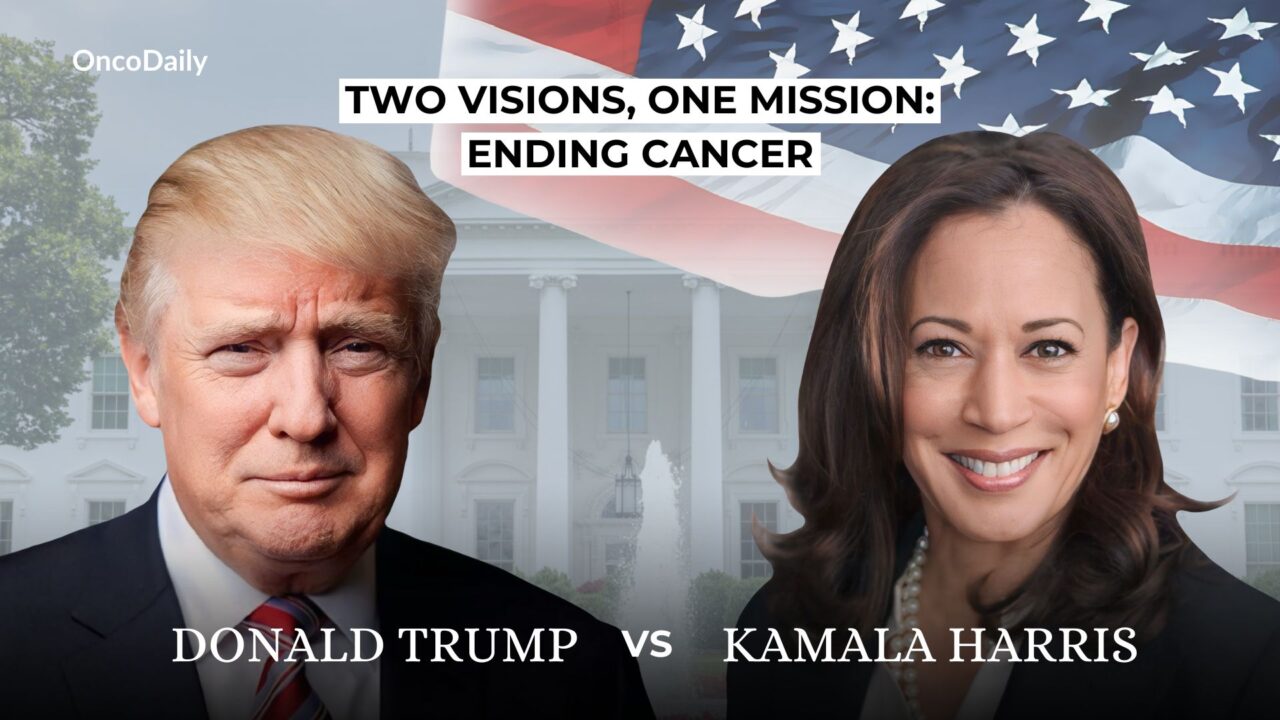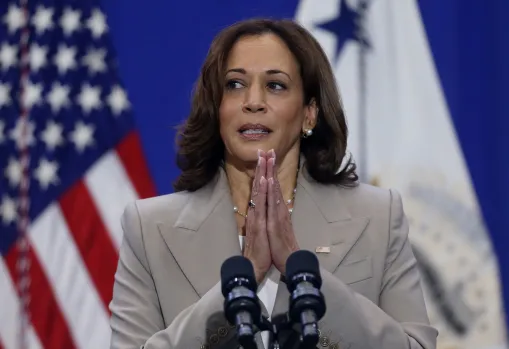Cancer remains one of the most pressing health challenges of our time, affecting millions of lives globally and requiring coordinated efforts in research, treatment, and policy. With the rise in cancer cases worldwide, leadership from policymakers has never been more crucial. In the U.S., Vice President Kamala Harris and former President Donald Trump have each taken significant steps to address cancer through their unique approaches and policy decisions.
This article provides an in-depth comparison of Kamala Harris vs. Donald Trump on cancer policy, examining how each leader’s initiatives have shaped research funding, treatment access, and patient care. From Harris’s active role in the Biden administration’s Cancer Moonshot to Trump’s efforts in pediatric cancer and experimental treatment rights, we explore how these two leaders have influenced the future of cancer care in America. By analyzing their contributions, we aim to provide a comprehensive look at how varied approaches to cancer policy can impact both the immediate needs of patients and the long-term goals of cancer research.
Kamala Harris and the Cancer Moonshot: Driving Change in Cancer Research and Equity
Vice President Kamala Harris has emerged as a driving force behind the Biden administration’s Cancer Moonshot Initiative, a bold plan to reduce the cancer death rate by 50% within 25 years. Harris’s involvement underscores her commitment to comprehensive cancer care, combining increased research funding with efforts to make cancer treatment and prevention more accessible and equitable.
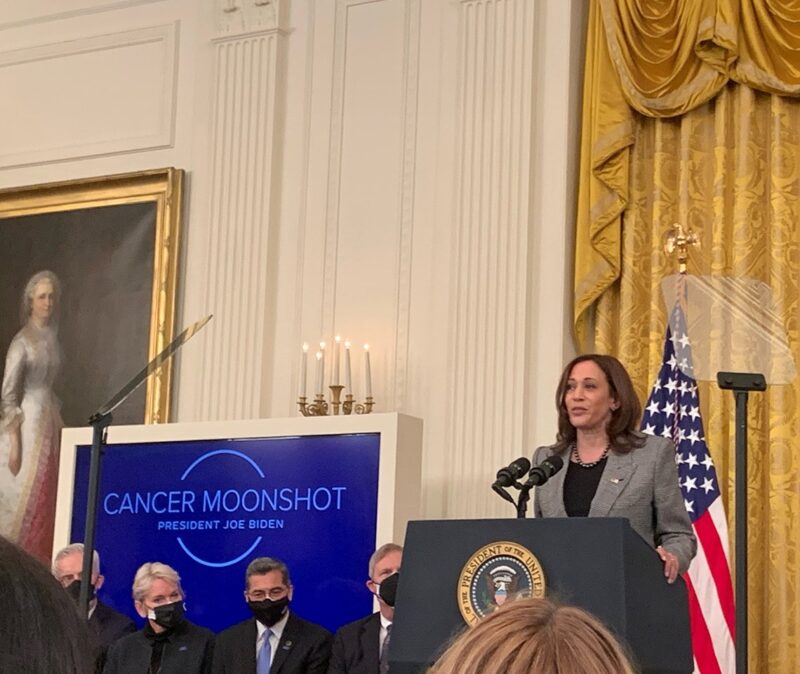
As Vice President, Kamala Harris has played a pivotal role in reinvigorating the Biden administration’s Cancer Moonshot Initiative—a bold plan aimed at reducing the cancer death rate by 50% over the next 25 years. With a strategic focus on research funding, equitable healthcare access, and technological innovation, Harris’s involvement highlights a comprehensive approach to cancer care.
Changing Cancer Research Funding
The Cancer Moonshot, relaunched in 2022 with Harris’s backing, received $1.8 billion through the 21st Century Cures Act to accelerate cancer research. Currently supporting over 250 active projects, this initiative targets cutting-edge areas like immunotherapy, precision medicine, and early detection—fields where recent advancements are already showing promise.
- Key Figures:
- $1.8 billion invested in 2022 for cancer research through the Cancer Moonshot
- 250+ research projects underway, focusing on emerging treatments and early diagnostic technologies
Through Harris’s support, the Cancer Moonshot aims to compress a decade of research progress into five years, enabling faster development of treatments that could fundamentally alter the cancer landscape.
Focusing on Health Equity
One of Harris’s most notable contributions to the Moonshot is her emphasis on health equity, a foundational pillar designed to reduce cancer-related disparities among racial, ethnic, and economically disadvantaged groups. Programs like Accelerating Colorectal Cancer Screening through Implementation Science (ACCSIS) demonstrate this commitment, promoting preventive screenings in low-income communities and directly addressing high mortality rates due to late detection.
- Equity-Focused Programs:
- ACCSIS Program: Targets increased colorectal screenings in underserved areas
- $135 million Cancer Moonshot Scholars: Funds early-career researchers from diverse backgrounds to drive equity in research and care
Driving Diversity in Clinical Trials
Acknowledging the critical need for inclusive research, Harris has been a strong advocate for diversity in clinical trials. By encouraging policies that ensure trials include participants from varied racial and ethnic backgrounds, Harris supports the creation of treatments that are effective across demographics.
- Funding for Diversity:
- $135 million allocated for the Cancer Moonshot Scholars program, specifically supporting underrepresented early-career researchers
- Policy Emphasis: The initiative mandates diversity across clinical trial demographics, aiming for broader applicability of research findings
Expanding Access to Early Detection and Prevention
In her leadership role within the Cancer Moonshot, Harris also promotes early detection and prevention as essential strategies for reducing cancer incidence. The Multi-Cancer Detection (MCD) Test Vanguard Study, involving 24,000 participants, is a groundbreaking initiative aimed at assessing blood tests for early cancer detection. Such efforts are expected to save lives by enabling early interventions, where survival rates can be as high as 90% for certain cancers.
“There should be nothing partisan about wanting a system where health coverage and care are based not on how much money you have or where you live. We need a system with the goal of good outcomes rather than the goal of high profits”
- Multi-Cancer Detection:
- 24,000 participants enrolled to evaluate blood tests for early cancer detection
- Potential 90% survival for cancers detected in early stages
Personal Story of Kamala Harris and her Mother’s cancer
Harris’s dedication to the Cancer Moonshot is deeply personal. Her mother, Dr. Shyamala Gopalan, was a renowned breast cancer researcher who ultimately lost her battle to colon cancer. This experience has profoundly shaped Harris’s commitment to healthcare reform, especially in cancer care, where she envisions an accessible, equitable, and proactive approach.
This personal experience has shaped Harris’s dedication to healthcare reform and cancer research. Harris’s own words reflect her commitment:
“My mother’s battle with cancer shaped my views on healthcare.”
she has stated, and this has been evident in her political priorities and policy decisions.

In an emotional interview with activist Ady Barkan in 2019, Harris recalled the day her mother shared the news. She described it as “one of the worst days of my life,” recounting how her mother, uncharacteristically dressed up and wearing makeup, met Harris and her sister for lunch to break the news1. The experience of navigating the healthcare system during her mother’s illness left a lasting impression on Harris, influencing her views on healthcare policy. She emphasized the difficulties of understanding medical information and the added stress of financial concerns for families dealing with serious illnesses.
Gopalan’s battle with cancer and her eventual passing in 2009 have been formative experiences for Harris, shaping her perspective on healthcare and informing her advocacy for improved access to medical care and research funding.
Donald Trump and Cancer Policy: Focusing on Pediatric Cancer and Expanding Access to Experimental Treatments
During his presidency, Donald Trump’s approach to cancer policy differed from Harris’s, with notable actions centered on pediatric cancer research and expanding access to experimental treatments for critically ill patients.While Trump’s administration didn’t introduce a comprehensive initiative like the Cancer Moonshot, it did contribute meaningfully to select areas within cancer research and patient rights.
The Childhood Cancer Data Initiative (CCDI): A Commitment to Pediatric Cancer Research
During his presidency, Donald Trump’s approach to cancer policy differed from Harris’s, with notable actions centered on pediatric cancer research and expanding access to experimental treatments for critically ill patients. While Trump’s administration didn’t introduce a comprehensive initiative like the Cancer Moonshot, it did contribute meaningfully to select areas within cancer research and patient rights.
The Childhood Cancer Data Initiative (CCDI), a central piece of Trump’s cancer policy, aims to leverage data-driven research to improve outcomes for children, adolescents, and young adults (AYAs) facing pediatric cancers. Launched by the National Cancer Institute in 2019, this 10-year, $500 million initiative is designed to build a robust data ecosystem, enhancing the ability of researchers and clinicians to analyze, share, and use clinical and genetic data from pediatric cancer patients across the nation. By systematically collecting and sharing data, CCDI strives to bridge gaps in pediatric cancer knowledge and accelerate the development of new, targeted therapies that could significantly improve survival rates and long-term outcomes for young patients.
- Funding and Scope:
- $500 million over ten years dedicated to building an extensive data ecosystem for pediatric cancer
- Annual $50 million allocation through the National Cancer Institute (NCI) to support the CCDI
The CCDI’s focus on data-sharing and collaboration among research institutions represents a groundbreaking approach in pediatric cancer. By integrating clinical and genetic data into a single platform, the initiative aimed to overcome data silos and allow researchers access to comprehensive information, which is essential for discovering targeted treatments and improving survivorship.
Enhancing Data Sharing and Technology Use in Pediatric Cancer Research
A core objective of the CCDI was to foster open data-sharing across institutions, addressing a longstanding issue in cancer research where data is often isolated within individual organizations. This collaborative data environment encouraged sharing of critical insights and facilitated research breakthroughs, a model that, if successful, could be extended to other areas of cancer research.
- Technology Integration:
- Advanced artificial intelligence (AI) and machine learning applications were incorporated to analyze large datasets within CCDI, enhancing precision in identifying cancer trends and treatment responses.
- The Molecular Characterization Initiative provided in-depth genetic analyses of childhood cancer cases, further enriching the CCDI database and supporting advances in precision oncology.
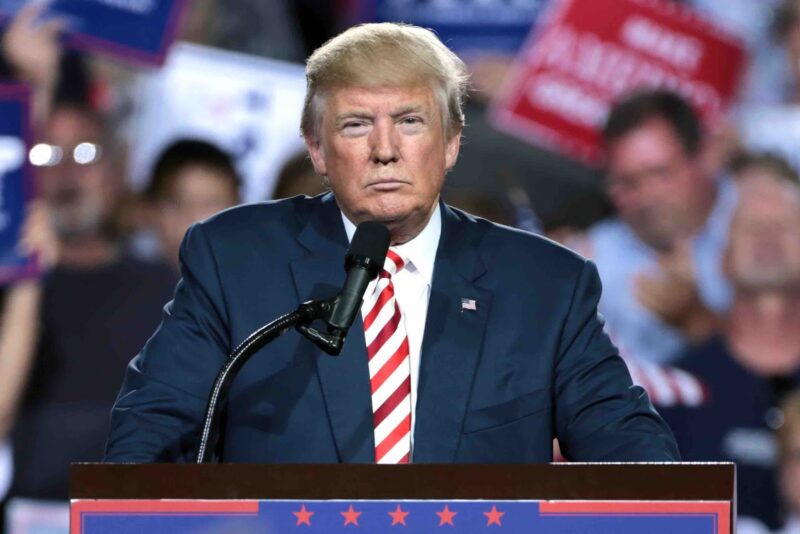
“We will unleash the power of American innovation, and as we do, we will soon be on the verge of finding the cures to cancer, Alzheimer’s disease, and many other diseases”
The Right to Try Act: Expanding Access to Experimental Treatments for Terminally Ill Patients
In 2018, Trump signed the Right to Try Act, a law designed to give terminally ill patients access to experimental treatments that had passed Phase 1 trials but were not yet FDA-approved. The act was intended as a pathway for patients who had exhausted traditional treatments to access unapproved therapies directly from drug manufacturers.
- Eligibility and Access:
- Under the Right to Try Act, terminally ill patients who could not participate in clinical trials gained the ability to bypass the FDA’s expanded access program (commonly known as “compassionate use”) and request experimental drugs directly from pharmaceutical companies.
- Despite Trump’s efforts that the act would benefit “thousands and thousands” of patients there are only 16 experimental drugs accessed under the act by 2024.
“We’re saving thousands and thousands of lives; it’s incredible and It’s a great feeling”.
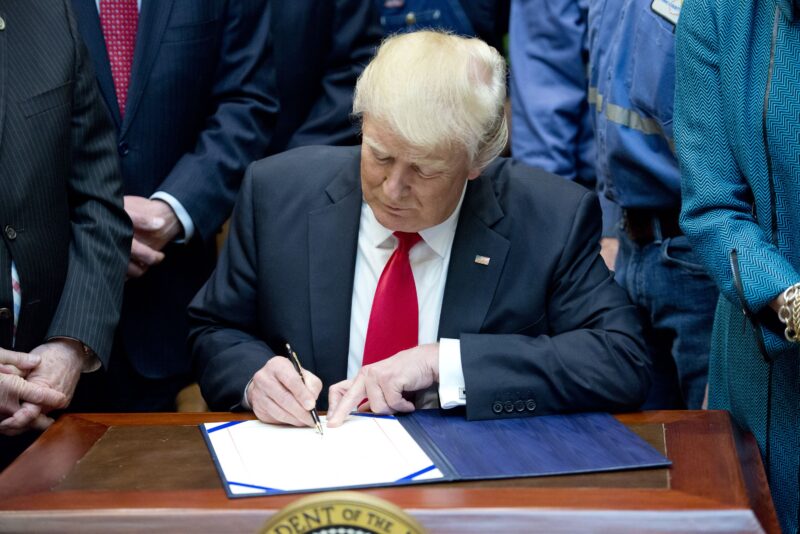
While the Right to Try Act sparked initial enthusiasm, it faced criticisms for its limited real-world impact. Critics argued that it bypassed essential safety checks, exposing vulnerable patients to unproven treatments without sufficient oversight, and that the FDA’s expanded access program was often more efficient.
- Impact
- Drug manufacturers were under no obligation to provide experimental treatments, which limited access for some patients.
- Due to the lack of FDA involvement, the agency couldn’t track adverse effects, raising safety concerns.
Natalie Harp, a cancer survivor and member of President Trump’s campaign advisory board, spoke at the Republican National Convention, praising Trump’s impact on medical policy, particularly the Right to Try Act, which allows terminally ill patients to access experimental therapies.
Harp shared her personal story, emphasizing how this policy provided her a lifeline:
“They didn’t give me the right to try experimental treatments, Mr. President. You did. And without you, I’d have died waiting for them to be approved.”
Proposed Budget Cuts to NIH and NCI
In contrast to Harris’s push for increased research funding, Trump’s administration proposed significant budget cuts to the National Institutes of Health (NIH) and the National Cancer Institute (NCI) as part of broader government spending reductions. These cuts, including a $900 million proposed reduction to the NCI’s budget in 2020, raised concerns among researchers and healthcare professionals about potential setbacks in cancer research and innovation.
- Budget Proposal Highlights:
- $4.7 billion (12%) NIH funding cut in the 2020 budget proposal, reducing funding from $39.1 billion to $34.4 billion
- $900 million (15%) NCI funding reduction, impacting research into cancer biology, early detection, and treatment advancements
This proposal marked the third consecutive year of suggested cuts to the NIH and NCI, raising concerns about stability in U.S. research funding. Although Congress ultimately countered the cuts by increasing NIH funding by $3 billion in 2018 and $2 billion in 2019, the proposals underscored the contrasting approaches toward government-supported cancer research.
Kamala Harris vs Donald Trump, Two Visions, One Mission – Ending Cancer
As illustrated by Kamala Harris and Donald Trump’s respective contributions, their leadership in cancer research reflects distinct yet complementary perspectives. Harris’s comprehensive approach to the Cancer Moonshot has prioritized expanding research funding, promoting diversity in clinical trials, and addressing health equity—a holistic strategy aimed at fundamentally reshaping cancer care in America. In contrast, Trump’s focus on specific, immediate needs, such as pediatric cancer research through the Childhood Cancer Data Initiative and patient rights under the Right to Try Act, underscores a policy vision centered on targeted impacts and patient empowerment.
While both leaders’ approaches differ, their collective actions demonstrate that cancer policy is not limited to a single strategy but is strengthened by diverse efforts. Whether through expansive initiatives like the Cancer Moonshot or targeted policies supporting pediatric research, each contribution adds a layer to the fight against cancer. Moving forward, the successes and challenges of both approaches may serve as valuable lessons for future leaders and shape an inclusive, innovative, and patient-centered path to conquering cancer.


